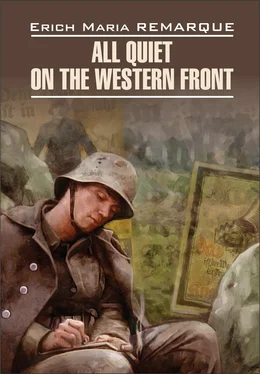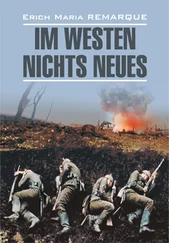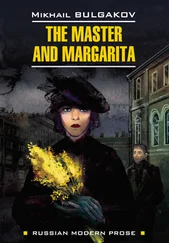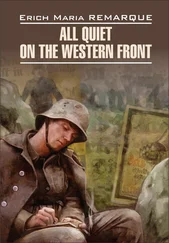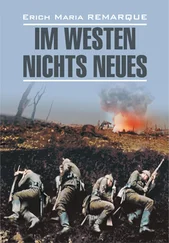He dismisses this in a superior manner and makes quite clear to me that I don’t know what is going on. ‘Yes, of course, the individual soldier thinks that, but you have to look at the whole thing,’ he says, ‘and there you just can’t make a judgement. You can only see your own small sector, and therefore you have no overview. You are doing your duty, you are risking your life, and that deserves every honour – every one of you should get the Iron Cross [202] Iron Cross – Железный крест (прусская и немецкая военная награда)
– but first and foremost the enemy front in Flanders has to be broken through and then rolled up from the top downwards.’
He snorts and wipes his beard. ‘Rolled up completely, that’s what’s got to happen, from the top down to the bottom. And then on to Paris.’
I’d like to know how he thinks it can be done, and I toss back the third glass of beer. He orders another one for me immediately.
But I leave. He tucks a few more cigars into my pocket and sends me off with a friendly slap on the shoulder. ‘All the best! And let’s hope that we soon get some proper news from you lads.’
I really imagined that leave would be different. A year ago it actually was different. I suppose I’m the one who has changed in the meantime. A great gulf has opened up between then and now. I didn’t know then what the war was really like – we had only been in quiet sectors. Now I can see that I have become more brittle without realizing it. I can’t come to terms with things here any more, it’s another world. Some people ask questions, others don’t, and you can see that they are pleased with themselves for not asking; quite often they even say with an understanding look on their faces that it’s impossible to talk about it all. They make a big thing of it.
I like being alone best, with no one to disturb me. Because everyone always comes round to the same topic of conversation, how badly things are going, how well they are going, one thinks this way, the next person the other way – and they quickly get on to the things that make up their own worlds. I’m sure that I was just like them myself, before; but now I can’t find any real point of contact.
They just talk too much. They have problems, goals, desires that I can’t see in the same way as they do. Sometimes I sit with one of them in the little garden of the pub and try to get the point across that this is everything – just sitting in the quiet. Of course they understand, they agree, they think the same way, but it’s only talk, only talk, that’s the point – they do feel it, but always only with half of their being, a part of them is always thinking of something else. They are so fragmented, no one feels it with his whole life; anyway, it is impossible for me to put what I mean into proper words.
When I take a look at them, in their rooms, in their offices, in their jobs, then I find it all irresistibly attractive, and I want to be part of it too, and forget the war. But at the same time it repulses me, it is so restricted, how can that fill a whole life, it deserves to be smashed to bits, how can things be like that when shrapnel is whizzing over the trenches out there and the Verey lights are going up, the wounded are being dragged back on tarpaulins and the lads are taking cover in the trenches? These people here are different, a kind I can’t really understand, that I envy and despise. I keep thinking of Kat and Albert and Muller and Tjaden – what are they up to? Perhaps they are sitting in the canteen, or swimming – and soon they’ll have to go up the line again.
In my room there is a brown leather sofa behind the table. That is where I sit.
There are lots of pictures pinned to the walls, pictures I once cut out of magazines. Postcards and drawings that took my fancy, too. In the corner there is a small iron stove. On the wall facing me are the shelves with my books.
I lived in this room before I became a soldier. I bought the books one at a time with money I earned by tutoring, lots of them second-hand, all the classics, for example, and each volume cost me a decent amount, hardbacks, in stiff blue cloth. I bought complete works, because I was thorough, and I didn’t trust the editors of selections to have chosen the best. So I only bought ‘Complete Works’ [203] Complete Work – полное собрание сочинений
. I read them with zeal and honesty, but most of them did not really appeal to me. I got so much more from the other books, from modem literature, and those books were much dearer, too. I came by a few of them in a less than honourable fashion – I borrowed them and never returned them because I couldn’t bear to part with them.
One shelf is frill of school books. I didn’t take care of them and they are very dog-eared. Pages have also been torn out – for various reasons. And below them are stacked exercise books, paper and letters, drawings and essays.
I try to think myself back into that time. It is still there in the room, I can feel it at once, the walls have preserved it. My hands are lying on the back of the sofa; now I make myself comfortable, tuck my legs in and sit easily, cradled in the sofa’s arms. The little window is open, and shows me the familiar view of the street with the church spire looming up at the end. There are a few flowers on the table. Pens, pencils, a shell for a paperweight, the inkwell – nothing here has changed.
It will be just like this, if I am lucky, when the war is over and I come home for good. I shall sit here, the same as before, and look at my room, and wait.
I feel agitated; but I don’t want to be, because it isn’t right. I want to get that quiet rapture back, feel again, just as before, that fierce and unnamed passion I used to feel when I looked at my books. Please let the wind of desire that rose from the multi-coloured spines of those books catch me up again, let it melt the heavy, lifeless lead weight that is there somewhere inside me, and awaken in me once again the impatience of the future, the soaring delight in the world of the intellect – let it carry me back into the ready-for-anything lost world of my youth.
I sit and I wait.
I remember that I have to go and see Kemmerich’s mother; I could visit Mittelstaedt as well, he must be at the barracks. I look out of the window. Behind the sunny street scene you can see the line of the hills, indistinct and pale, and it merges into a bright autumn day and I’m sitting with Kat and Albert by a fire eating baked potatoes in their jackets.
But I don’t want to think about that, and I push the thought away. Let the room speak, let it take me up and carry me along, I want to feel that I belong here and I want to listen, so that when I have to go back to the front I shall know this: the war will sink and drown when the wave of our homecoming sweeps across it, the war will be over, it will not devour us, it has no real power over us, its hold on us is only a superficial one.
The spines of the books stand side by side. I know them all, and I remember putting them in order. With my eyes I implore them: speak to me – take me up – take me up again, you old life – you carefree, wonderful life – take me up again —
I wait, wait.
Pictures flash past, they don’t fix themselves, they are just shadows and memories.
Nothing – nothing.
My impatience grows.
Suddenly a terrible feeling of isolation wells up inside me. I can’t get back, I’m locked out; however much I might plead, however much I try, nothing moves, and I sit there as wretched as a condemned man and the past turns away from me. At the same time I am frightened of conjuring it up too much because I don’t know what would happen then. I am a soldier. I have to cling to that.
Читать дальше
Конец ознакомительного отрывка
Купить книгу
